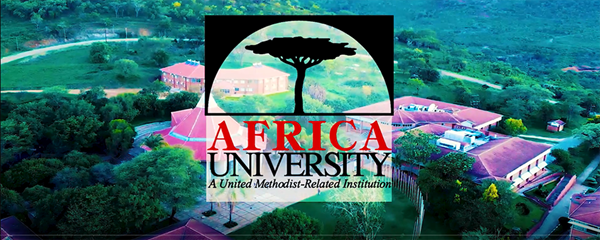May 29 – Central Conference Theological Education Fund
A Moment for Mission
“Light dawns for the righteous, and joy for the upright in heart. Rejoice in the Lord, O you righteous, and give thanks to his holy name!” — Psalm 97:11-12, NRSV
After he earned a bachelor of divinity degree at Africa University in 2009, the Rev. Mathias Marinyame of the Zimbabwe East Annual Conference longed to pursue a master’s degree at the United Methodist institution. Financial challenges, however, blocked his path.
In Africa, Europe and the Philippines, obtaining a theological education can be difficult, due to the distance between seminaries, cost, shortage of well-trained professors and availability of resources in needed languages.
A grant from the Central Conference Theological Education Fund (CCTEF) helped change that for Marinyame.
“I am now a pastor with a different mindset,” he said. “I discovered a gap in the way I used to practice ministry. The lectures and intensive research have managed to fill that gap.” Without the grant, Marinyame said, furthering his education would have been impossible.
Established by the 2012 United Methodist General Conference, CCTEF grants provide access to theological education through e-learning and other resources. The 2016 General Conference approved $10 million from the World Service Fund toward strengthening theological education and pastoral formation in the central conferences.
“The fund also ensured I have full-time accommodation on campus as well as meals,” Marinyame said. “I have access to Wi-Fi for my research. Medical health is also cared for, and that gives me a sense of security, even during this COVID-19 pandemic era.”
This year, Marinyame graduated from Africa University with a master’s degree in religious studies with a focus on pastoral care and counseling.
Adapted from “CCTEF Grant Recipient Spotlight,” Jan. 27, 2022, General Board of Higher Education and Ministry website. Used by permission.
Children’s Message
What do pastors do? Preach, pray and lead worship? Tell people about Jesus? Lead Bible studies? Welcome newcomers to church? Visit sick people?
United Methodist pastors go to a seminary or theological school. In the United States, they can choose from more than 10 of these special schools. Many receive scholarships and other financial aid.
In other parts of the world like Africa, Europe and the Philippines, becoming a pastor is harder. A person may not have enough money for seminary. They may live far away from a theological school.
The Central Conference Theological Education Fund helps future pastors go to seminary. Isn’t it wonderful that our church does so much to help people get the training they need to serve churches around the world?
Offertory Prayer
Loving God, thank you for generous United Methodists who share so that theological education is available to those who answer your call to ministry around the world. We love you. Amen.
From Discipleship Ministries: Seventh Sunday of Easter — God of justice and mercy: The temptation is strong to make our gifts to you on Sunday feel as if we’ve done all that is expected, then wake up on Monday and live like all the rest of the world. Deep in our souls, we know that’s not what Christ called us to do, but the safe road is so much easier. God of compassion, embolden us to be involved in some “good trouble.” Embolden us to stand out against the backdrop of a world that says, “take care of your own.” Embolden us to use our voices to speak on behalf of the voiceless, to use our ears to hear the discouraged and defeated, and to use our arms to help the weak and powerless. In the name of the one who conquered death. Amen. (Acts 16:16-34)
Newsletter Nugget
The Central Conference Theological Education Fund was established by the 2012 United Methodist General Conference. United Methodists continue to live out Charles Wesley’s vision: to “unite the pair so long disjoined—knowledge and vital piety.” The fund’s goal is to strengthen theological education and pastoral formation in the central conferences in Africa, Europe and the Philippines. Money plays a crucial role in such efforts, and in 2016, delegates to General Conference approved $10 million for the fund from the World Service Fund.
Gifts are to be used for developing theological schools, courses of study and libraries and contextual resources. Funds also assist scholarships and faculty enrichment and support associations and networks of faculty and schools, as well as new and innovative approaches to theological education.
The Commission on Central Conference Theological Education gives priority to requests that build capacity and sustainability and that develop contextual education, resources and new/innovative initiatives.
Adapted from General Board of Higher Education and Ministry website. Used by permission.

